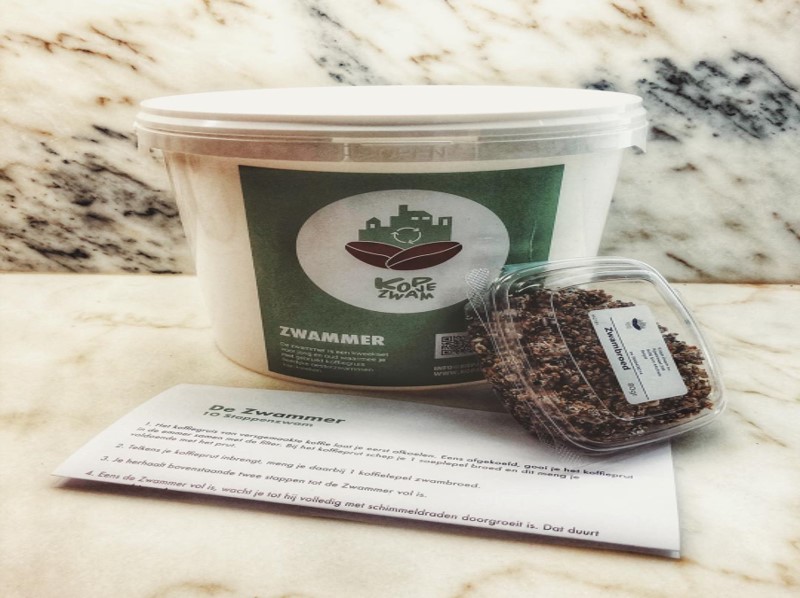Geen bewerkingssamenvatting |
k (Tekst vervangen - "{{Project" door " {{Project") |
||
| (Een tussenliggende versie door een andere gebruiker niet weergegeven) | |||
| Regel 1: | Regel 1: | ||
==== '''Summary''' | == Facts == | ||
* Country: Belgium | |||
* Type of provider: circular urban agriculture | |||
* Focus: | |||
** Reduce and recycle: Kopjezwam grows oyster mushrooms on residual flows such as coffee grounds (from Bruges catering industry) and coffee husks (from local roasters). They reuse this residual flow and use it to create added value. After a few harvests, they compost the substrate. And they grow microgreens on the compost obtained. | |||
== '''Summary of the project''' == | |||
"Growing a tasty product on waste" | "Growing a tasty product on waste" | ||
| Regel 10: | Regel 16: | ||
As a producer you always have to deal with surpluses of unsold products, less beautiful products or parts of your product that are cut off for the sake of beauty. Obviously this is not ok, so they searched for a way to process these surpluses and now they make an oyster mushroom burger of these. | As a producer you always have to deal with surpluses of unsold products, less beautiful products or parts of your product that are cut off for the sake of beauty. Obviously this is not ok, so they searched for a way to process these surpluses and now they make an oyster mushroom burger of these. | ||
== Cross-border == | |||
Residual flows like coffee grounds, coffee husks and brewer's grains are everywhere. The concept of this best practice can be transferred to any other location. | Residual flows like coffee grounds, coffee husks and brewer's grains are everywhere. The concept of this best practice can be transferred to any other location. | ||
==== | == More information == | ||
Do you want to know more about this organization? Please visit their website: <nowiki>https://kopjezwam.be/</nowiki> | |||
Facebook: <nowiki>https://www.facebook.com/oesterzwammen/</nowiki> | Facebook: <nowiki>https://www.facebook.com/oesterzwammen/</nowiki> | ||
Instagram: <nowiki>https://www.instagram.com/kopjezwam/?hl=nl</nowiki> | Instagram: <nowiki>https://www.instagram.com/kopjezwam/?hl=nl</nowiki> | ||
{{Project FACET Practice config}} | {{Project FACET Practice config}} | ||
{{Project | {{Project | ||
|Name="Growing a tasty product on waste" | |Name="Growing a tasty product on waste" | ||
| Regel 44: | Regel 45: | ||
|Show title=Nee | |Show title=Nee | ||
}} | }} | ||
{{Project FACET Practice additional | {{Project FACET Practice additional | ||
|Theme=Waste management | |Theme=Waste management | ||
Huidige versie van 25 mrt 2024 om 10:51
Facts
- Country: Belgium
- Type of provider: circular urban agriculture
- Focus:
- Reduce and recycle: Kopjezwam grows oyster mushrooms on residual flows such as coffee grounds (from Bruges catering industry) and coffee husks (from local roasters). They reuse this residual flow and use it to create added value. After a few harvests, they compost the substrate. And they grow microgreens on the compost obtained.
Summary of the project
"Growing a tasty product on waste"
Based on this idea, the Bruges urban agriculture project Kopjezwam was started in 2015. They recover residual flows (coffee grounds, coffee husks and brewer's grains) from local coffee bars, coffee roasters and a microbrewery. They grow delicious products such as oyster mushrooms, shiitake and micro vegetables on it. The oyster mushrooms grow on a substrate of coffee grounds and coffee husks, shiitake on a substrate of brewer's grains and coffee husks. After harvesting, the fungus substrate is composted, after which microgreens are grown on the compost obtained.
500 kg of residual flows are collected by Kopjezwam every week and reused as a basis for the cultivation of various tasty products. By selling their DIY kit, De Zwammer, they get a lot more extra kilos from the local waste mountain. However, they are ambitious and want to further increase the volume of residual flows that they collect from the waste mountain.
Kopjezwam creates added value on various residual flows. They also extend this principle when it comes to commercial space. They have always consciously chosen to work in vacant and therefore unused spaces. Kopjezwam strives to sell the fresh products in a short chain.
As a producer you always have to deal with surpluses of unsold products, less beautiful products or parts of your product that are cut off for the sake of beauty. Obviously this is not ok, so they searched for a way to process these surpluses and now they make an oyster mushroom burger of these.
Cross-border
Residual flows like coffee grounds, coffee husks and brewer's grains are everywhere. The concept of this best practice can be transferred to any other location.
More information
Do you want to know more about this organization? Please visit their website: https://kopjezwam.be/ Facebook: https://www.facebook.com/oesterzwammen/
Instagram: https://www.instagram.com/kopjezwam/?hl=nl

